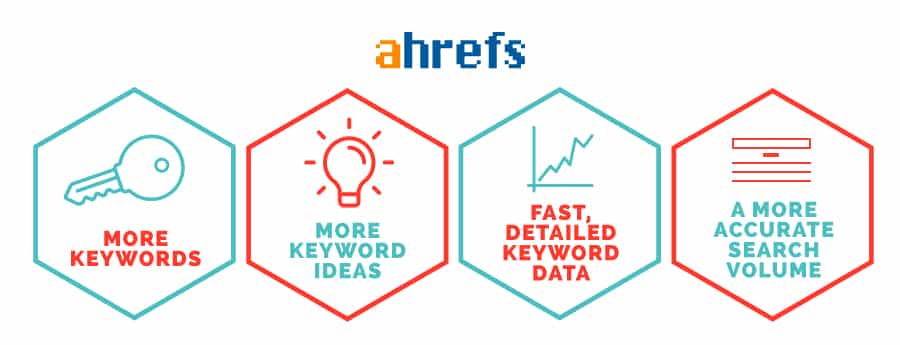Keyword Explorer is just one of the five tools you get with a subscription to Ahrefs. Many other companies offer a keyword tool, but the Ahrefs explorer is the industry’s gold standard. It is a powerful research tool that helps you generate keywords, analyze them, and use multiple, in-depth keyword metrics to improve ranking and build links.
For e-commerce, this is an essential tool. To rank, get clicks, and make sales, you need to do your keyword research. Using the right keywords guides customers to your pages and products. Keyword explorer helps you find those keywords.
It starts by generating thousands of ideas for keyword phrases based on just one that relates to your site. Then, the tool provides an in-depth analysis of that keyword and advanced metrics on your list of those you think have the most potential. Take that aggregated list with parameters and save it right in Keyword Explorer so you can return to it as you plan and implement an SEO campaign.
Pro tip: use the keyword explore to identify keywords to optimize press relases or thought leadership articles for digital PR

Why Ahrefs Keyword Explorer is the Gold Standard
A few years ago, Ahrefs updated its Keywords Explorer tool releasing the 2.0 version. It is now considered by most SEO professionals to be the best keyword research tool in the industry. Here’s why:
- More Keywords — Ahrefs has the most significant third-party database of literally billions of keywords. It currently has more than seven billion keywords.
- More Keyword Ideas — Use several different reports to generate thousands of filterable keyword ideas. For example, the phrase match report lets you narrow down a list of thousands of phrases using your keyword by filtering for things like minimum keyword difficulty, search volume, or word count.
- Fast, Detailed Keyword Data — Instantly get detailed data on keywords, including a keyword difficulty score, the number of backlinks needed to rank, monthly search volume, seasonal information, clicks, and CPC metrics, parent topics, SERP overview and history, and more. Get all this important information in one place and save time.
- A More Accurate Search Volume — Most keyword explorer tools get their search volume data from Google Keyword Planner, and yet there are differences from one tool to the next. This is because Google’s number is a rounded, yearly average. To be as accurate as possible, the search volume must be updated every month. Ahrefs does this and uses clickstream data from more than ten search engines for unparalleled accuracy and relevant, up-to-date information.
How to Use Ahrefs Keyword Explorer for e-Commerce
The Keyword Explorer tool from Ahrefs can help you build your page ranks and get more traffic and clicks, with the goal of making more actual sales on your e-commerce site. Research on keywords using this tool includes three platforms:
- Generate ideas for keywords — The first step in using Ahrefs Keyword Explorer is to generate ideas for the exact keywords you’ll use for SEO. Ahrefs will give you a list of thousands of ideas based on the target keyword you input. This gives you a lot of options to sort through.
- Analyze your chosen keyword with advanced metrics — With all those options, you need to narrow them down. You can’t use 100,000 different keyword ideas, and you don’t want to simply make a random selection. The analysis of your chosen keyword will help you consider and weigh factors like how difficult it will be to rank for a particular term against its search volume.
- Check the metrics on your keyword list — With a list of keywords that have the potential to improve your page ranks, get a report on their metrics. This aggregate of information helps you collect all the information on your best keywords in one place.
Generate Keyword Ideas
To generate keyword ideas, start with your most obvious keyword or topic. For instance, if you import, blend, and sell teas, start with a keyword like “black tea.” You can input up to ten keywords to generate ideas. What you get is a list of hundreds to hundreds of thousands of related keyword ideas.
The broader the term, like tea, the more results you will get, thanks to the billions collected in the Ahrefs database. Play around with general, broad terms and those that are more specific to see what kinds of metrics you get. With a list of keyword ideas, you can then use several tools on the overview page and the menu on the left to generate and sort through those keywords:
- Phrase Match — This report gives you a list of all keyword phrases that have the exact term that you inputted into the explorer. For instance, you might get “decaffeinated black tea” or “black tea diffuser.”
- Having the Same Terms — This is similar to phrase match but gives you all the keyword ideas that include your keyword terms in any order. This generates more ideas by mixing up your search terms: “tea black vs. green” or “tea herbal black blend.”
- Also Rank For — With this report, you can see the top ten highest-ranking pages for your keyword. From this report, you’ll also see all the other keywords for which those pages rank. If you put in the search term “black tea,” you’ll see that the high-ranking pages include e-commerce sites, like republicoftea.com but also informational pages, like webmd.com. As a retailer, you’ll want to see the keywords that republicoftea.com ranks for to see what search terms shoppers are using.
- Search Suggestions — This lists the suggestions that pop into the Google search bar when you begin to type in your keyword, like “black tea caffeine” and “black tea brands.”
- All — If you select all, you’ll get a report that includes all of the above.
Analyze Keywords
With hundreds of thousands of keyword ideas generated for selling black tea on your e-commerce site, use Keyword Explorer’s in-depth analysis tools to narrow them down to a manageable number. Instead of just picking those that seem useful, use these metrics to make smarter choices. Click on metrics for any keyword in your list to get the metrics.
Keyword Difficulty and Search Volume
These are two of the most useful metrics for narrowing down keyword ideas. Keyword difficulty is an Ahrefs rating that tells you how hard it will be to rank for that particular keyword. It also tells you how many backlinks you would need to get for a top-ten ranking. Search volume tells you how many times per month people searched for that keyword.
The best keywords to improve your rank will be those with higher search volume and lower keyword difficulty. You’ll find that broad terms, like “black tea,” are high in both and may not be worth your while to use. Something more specific, like “black tea from India,” may give you a decent number of searches with a lower difficult rating.
Return Rate
This is a relatively new metric for Keyword Explorer and is exclusive to Ahrefs. It shows you how often searchers returned to a specific keyword relative to others, which is useful in picking between potential keywords for e-commerce.
For instance, “black tea vs. green tea” is a term someone might search for once because they get the information they need on which type of tea is better for health. But a word like “Darjeeling tea from India” may get more repeat searches because an individual is coming back to Google to buy the tea multiple times. For retail, you want terms that get repeat searches.
Just remember that this is a relative, not an absolute metric. So, for example, if the return rate for “black tea vs. green tea” is 1.05 and for “Darjeeling tea from India” is 1.5, it means people return to the latter more often in their searches.
Parent Topic
This metric shows you the top-ranking page for your keyword and that page’s best keyword. This gives you an idea of whether or not your keyword is part of a larger parent topic. It can help you rank for your chosen keyword, while also optimizing the page for other keywords in the same parent topic.
Parent topic is especially helpful for your more specific, longtail keywords. For example, if you input “where to get Darjeeling tea,” you may find it belongs to broader topics relating to black tea types or teas from India. Use the parent topic you discover to determine if you really need a page devoted entirely to Darjeeling and other Indian teas or if you can rank for several of these related parent topic keywords in one page.
Clicks
The clicks metrics show you how many searches resulted in clicks. Search volume is the number of searches for a keyword, while the clicks metric gives you the actual number of clicks. Clicks per search (CPS) tells you if people click on more than one result for a particular keyword.
CPS is important for e-commerce because it shows you search terms people use to shop around for a product. A keyword with more than one CPS also tells you that there is no definite leader page getting all the clicks. People are trying more than one page when they search on that keyword.
If you find that a keyword like “best Darjeeling tea” gets more than one CPS, it shows that people are shopping for that tea and that no single page in the top ten is providing the best information. You have a better chance of getting a high rank for this term than for another keyword that results in just one CPS.
SERP
SERP, or search engine results page, provides the history of page ranks for a keyword. If you use a broad term like “black tea brands,” you may find that the same few pages consistently rank at the top. It will be difficult to break into the top five or ten for this term and you may want to try a different one.
The SERP metric will also show you important metrics for those top-ranking pages: number of backlinks, parent website domain rating, search volume, and the other keywords for which those pages rank. This information can help you get a picture of what it takes to rank for the keyword. If ranking would require more backlinks than you can generate or too much search volume, you can try another keyword.
Get Metrics for Your Keywords
Once you have generated keyword ideas and narrowed them down to a reasonable list using the analysis tools, store that list and generate an aggregate of metrics. Upload or import your list of keywords and generate the report.
In the overview page you’ll see aggregated statistics for your list. This includes things like total search volume, total clicks, how the keywords are distributed by search volume, search by domain, and the search by country.
On the metrics page you get a list of all the keywords with the advanced metrics for each one. Use this page to filter things like keyword difficulty, clicks, clicks per search, search volume, and others to get a more focused list of useful keywords. Save your list in Keyword Explorer and you can add to it, filter it, make other changes, and keep returning to it as you build a campaign.
Ahrefs Keyword Explorer is full of tools that are invaluable in generating, analyzing, and using keywords to help rank any site. For your e-commerce site, the metrics available here are essential for ranking, driving traffic, and making sales.
Combine keyword explorer and media research tools like MuckRack or Prowley for the organic asset marketing strategy (OAM) to identify keywords to search for media placement opportunities.




